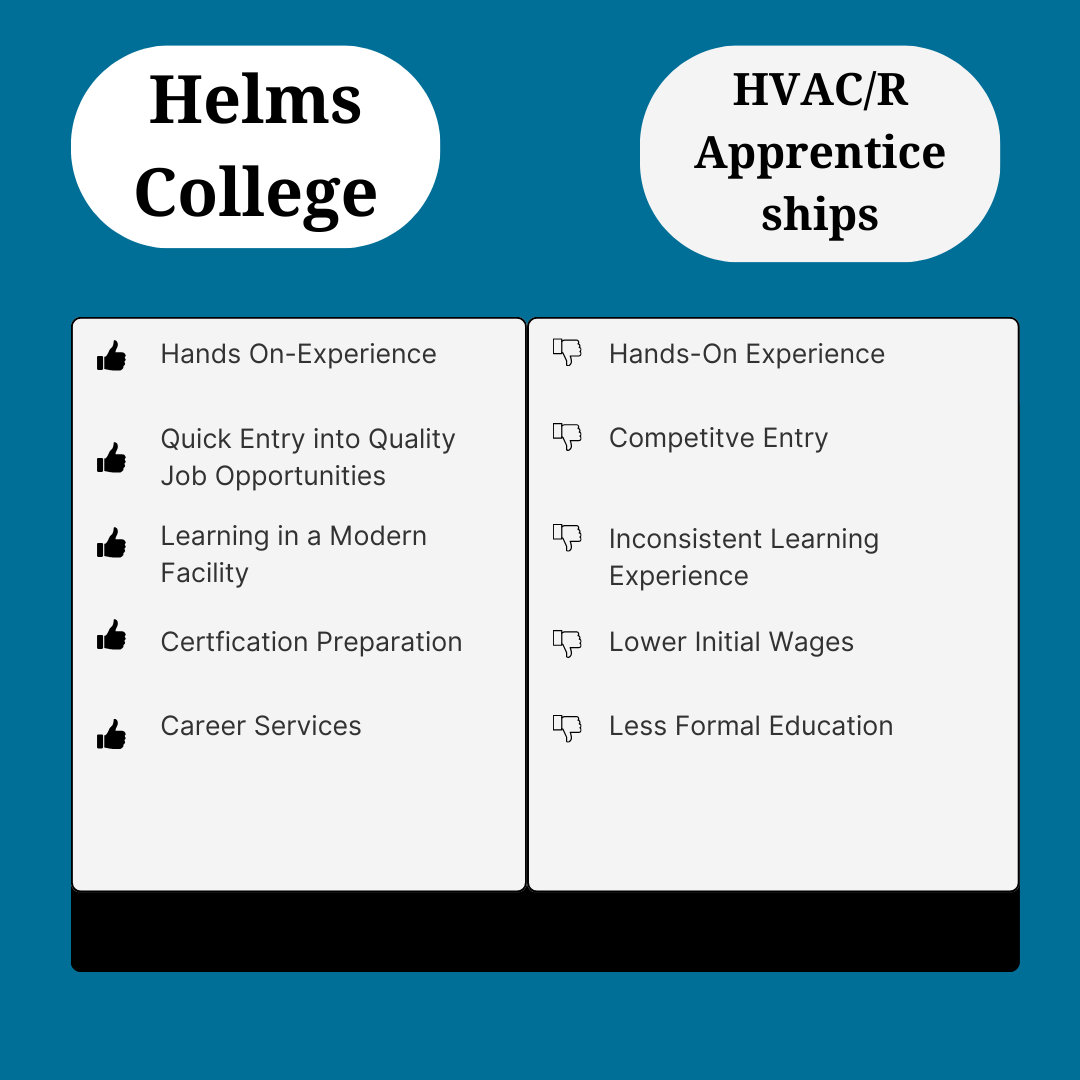Navigating the path to a successful career in the HVAC/R industry begins with a first step. As you weigh the options between HVAC/R trade schools and apprenticeships, understanding the advantages of each can significantly impact your career trajectory. In this blog, we’ll explore why a program like the one offered at Helms College is the key to unlocking your potential and propelling you into this in-demand field swiftly and effectively.
Understanding the Options for Becoming an HVAC/R Technician
In the realm of HVAC education, prospective students often find themselves weighing two prominent options: enrolling in HVAC trade schools or embarking on apprenticeships. While trade schools like Helms College offer structured, comprehensive curriculums in state-of-the-art facilities, apprenticeships provide on-the-job experience. Each path caters to different learning preferences and career aspirations.
Curriculum and Hands-On Experiences
When comparing HVAC/R trade schools and apprenticeships, each path’s curriculum and hands-on experience are pivotal in shaping a student’s expertise and readiness for the industry. Helms College’s HVAC/R program is meticulously designed to blend theoretical knowledge with practical skills, utilizing modern labs to simulate real-world HVAC/R scenarios. Conversely, apprenticeships provide immersive on-the-job training in HVAC/R, focusing heavily on practical experience but often with less formal classroom education, affecting the breadth of foundational knowledge acquired.
HVAC/R Certification and Career Readiness
Certification and career readiness are key outcomes for students in the HVAC/R field, distinguishing the value between HVAC/R trade schools and apprenticeships. Helms College’s HVAC/R program is strategically structured to provide comprehensive training and streamline students’ path to certification, a crucial credential for career advancement in the HVAC/R industry. While apprenticeships offer practical experience, the formalized curriculum at Helms College ensures that students are well-prepared for certification exams and equipped with a broad skill set for diverse HVAC/R career opportunities.
Time Invest for Career Entry
For an HVAC/R apprentice, the prospect of starting in the field and getting immediate hands-on experience can be enticing. While there is a tangible benefit to anyone who wants to start as an apprentice, the training will generally span several years, along with on-the-job training. As opposed to the Helms College program, in 12 months you will be prepared with hands-on experience from our seasoned veteran instructors, with the technical expertise to pass your certifications. At this stage, you’ll be further ahead than your apprenticeship counterparts and ready to accelerate your career.
Demand For HVAC Technicians
The demand for skilled HVAC/R technicians is on a steady rise, driven by increasing construction activities, the need for energy-efficient systems, and the continuous demand for system maintenance and upgrades. Engaging in a technical program like the one at Helms College can significantly expedite your entry into this burgeoning field, offering a direct pathway to gaining the essential skills and knowledge that employers are actively seeking. On the other hand, securing an apprenticeship can be challenging, with more applicants than available positions, leading to potential delays in starting your career. By choosing a technical program, you’re not only gaining a comprehensive education but also positioning yourself to quickly tap into the job market, meeting the industry’s urgent need for qualified professionals. Thus, starting with a tech program is a strategic choice for those eager to launch their careers in HVAC/R, ensuring they’re job-ready in a shorter timeframe, and able to seize the opportunities in this high-demand field without delay.
People Also Ask
What Are the Benefits of Attending an HVAC/R Trade School Over an Apprenticeship?
Trade schools offer structured learning and faster certification.
How Does Formal HVAC/R Training Impact Career Readiness and Certification?
It provides comprehensive knowledge and prepares students for certification exams.
Is It Faster to Start a Career in HVAC/R Through Trade School or Apprenticeship?
Trade school is typically quicker, often taking about a year.
Why Is There a High Demand for Certified HVAC/R Technicians?
Growing construction, energy needs, and maintenance drive demand.
What Should I Look for in a Quality HVAC/R Training Program?
Look for hands-on training, experienced instructors, and certification preparation.
Best HVAC/R Training Programs in Macon
Ready to jumpstart your career in the HVAC/R industry and become a part of the workforce that’s in high demand? Helms College’s HVAC/R program is your gateway to acquiring top-notch skills and knowledge, setting you on the path to success. Fill out our inquiry form now to learn more about our program and take the first step towards a rewarding career in HVAC/R – your future is waiting!

